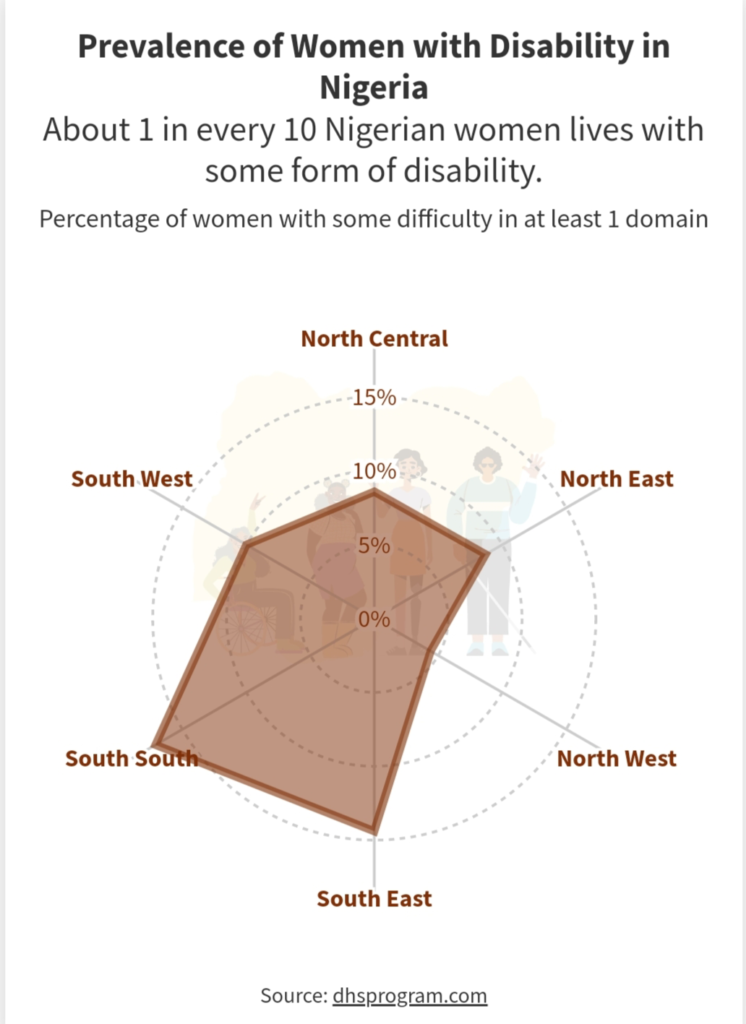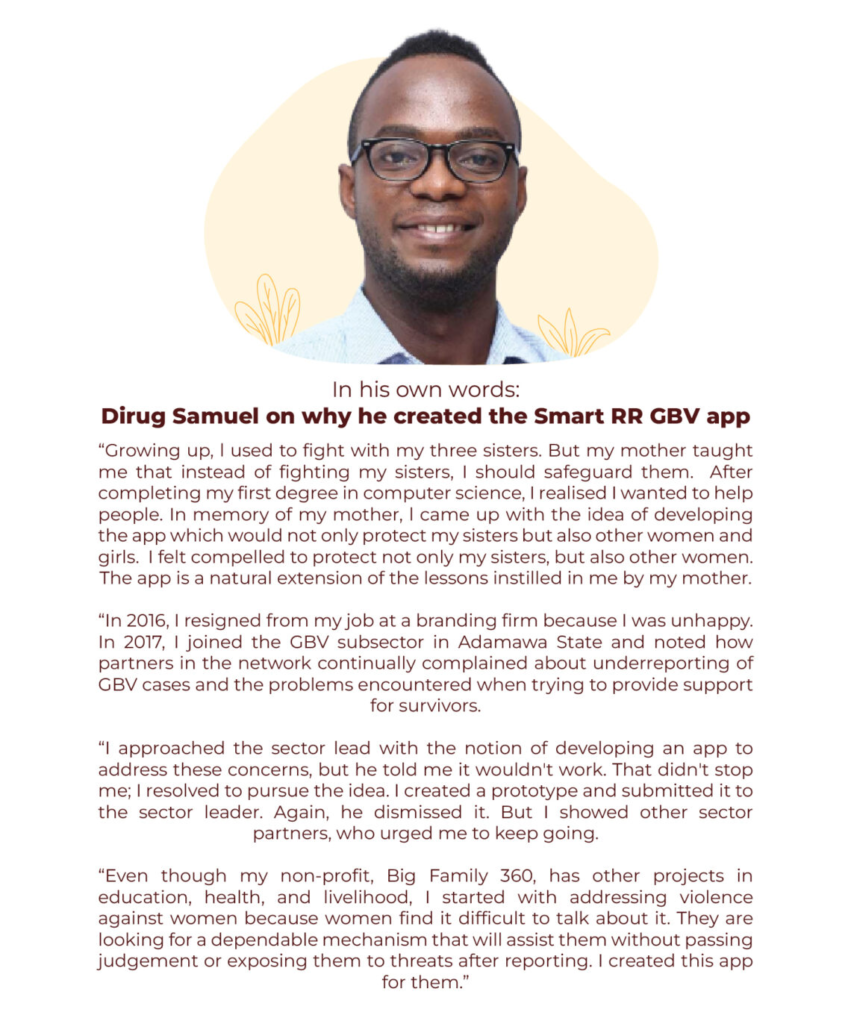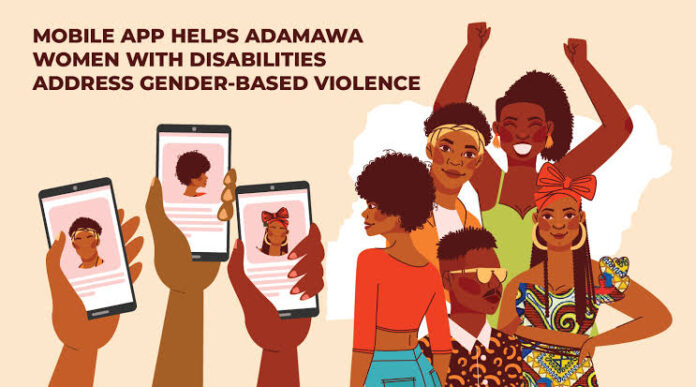The 2018 Nigeria Demographic Health Survey, carried out between 2013 and 2018, indicated that 36% of married women in Nigeria have experienced physical abuse at the hands of their partners.
For 38-year-old Aisha (name adopted to protect the survivor’s identity), getting married in Adamawa State, North-east Nigeria, in 2017 was the realisation of a lifelong goal. She looked forward to a happy union. But her joy was fleeting.
“A few months into the marriage, I noticed a change in my husband’s behaviour. He became withdrawn; this progressed to his shouting at me and then the beatings started. He said my disability had kept him from enjoying sex because it requires a lot of patience, which he does not have,” Aisha, who lost the use of her legs due to childhood polio, told PREMIUM TIMES.
“He complains that whenever we want to have sex, he has to assist me in getting into a suitable position and undressing me, and this makes him lose his sexual desire.”
Surviving economic abuse
While Aisha contends with physical assault, Mariam (real name withheld), who also lost the use of her legs as a child due to polio, is subjected to physical as well as economic abuse.Her husband, whom she married in Adamawa State in 2020, has prevented her from starting a business and does not provide for her or their three children’s needs. As a result, their children do not go to school.
According to her, her husband did these things because he was unaware that she requires constant assistance, and became fed up and frustrated, and transferred the aggression to their children too.
“He shut me down, never allowed me to express myself, and prevented me from associating with people.
“I always stayed indoors with my children because they were not going to school. He also did not allow me to work, so I was solely dependent on him,” she recounted.

According to a 2013 report by the United Nations 53rd Committee on the Status of Women, women (and girls) with disabilities like Aisha and Mariam are more likely than other women to be victims of gender-based violence (GBV). They are more vulnerable because they are “particularly targeted by perpetrators of violence due to social exclusion, limited mobility, a lack of support structures, communication barriers, and negative social perceptions.”

Further, statistics from the World Health Organisation reveal that one in three women worldwide is a victim of physical or sexual violence from an intimate partner. This statistic has remained unchanged in the past 10 years. The 2018 Nigeria Demographic Health Survey, carried out between 2013 and 2018, indicated that 36% of married women in Nigeria have experienced physical abuse at the hands of their partners.

Women in violent relationships may also experience economic abuse in a variety of forms, like being denied access to bank accounts, information, and decision-making rights regarding finances, according to a publication by the Canadian Center for Women’s Empowerment.
Unlike other forms of gender-based violence, economic violence is a form of gendered violence that is usually hidden and invisible because prominence is given to physical, sexual, emotional, and psychological violence.
Although there are no studies to show the ratings of economic abuse in comparison to other forms of gendered violence, a 2013 study demonstrated that increased experiences of economic abuse were significantly related to increased experiences of physical, psychological and sexual abuse.
A former director of the Center for Gender Security Studies and Youth Advancement at the University of Abuja, Mabel Evwierhoma, a professor, corroborated these findings and told PREMIUM TIMES that more research is needed on the various forms of GBV, particularly for persons with disabilities.
The WHO indicated that the social and economic costs of intimate partner and sexual violence have ripple effects, causing women to suffer isolation, inability to work, loss of wages, lack of participation in regular activities, and limited ability to care for themselves and their children, as seen in Mariam’s case where she and her children were financially deprived.
For Aisha and Mariam, relief came after attending training for women with disabilities in 2022.

Godiya Simon, the woman leader of the Nigerian Association of Persons with Disabilities in Adamawa State, who facilitated the training, introduced them to Smart Reporting and Referral (Smart RR), a mobile phone application for reporting GBV cases.
GBV app saving lives since COVID-19 pandemic
The Smart RR app was developed by Dirug Samuel, the founder of the Big Family 360 foundation. The app was launched in time to help women and girls during the COVID-19 lockdown in Nigeria in 2020. According to him, two weeks after the launch, they had 500 downloads and over 70 reported cases. Later, they got a Google grant for free advertisements, which gave the app more reach, making it visible to more people.

from founder, Dirug Samuel
During this period, they connected the survivors to service providers on the mobile application. The app, which is in Hausa, has a chat feature with prompts to ‘talk to a counsellor’, ‘report a case for yourself’, and ‘report a case for someone’. It also has a list of mapped information with email addresses and phone numbers of women’s support organisations, shelters, and state authorities.
Depending on the service requested, the app links the user to a Sexual Assault Referral Centre within their location for medical treatment, a counsellor for psychosocial support, security agencies for safety, or the International Federation of Female Lawyers, Nigeria (FIDA) for free legal representation.
The free app is available on the Google Play Store for Android phones and requires internet access. For those without smartphones, the foundation purchased a USSD code, *347*108#, which can be dialled free of charge to report these cases.
This USSD option comes in handy for Nigerian women who are affected by the gender gap in smartphone usage in the country. According to the 2022 GSM Association ‘Mobile Gender Gap Report,’ 92 per cent of Nigeria’s adult male population have mobile phones compared to 88 per cent of the nation’s adult female population. Only 32 per cent of Nigerian women, compared to 51 per cent of Nigerian men, own smartphones.
As of January 18, over 400 people in seven states—Adamawa, Borno, Osun, Lagos, Calabar, Delta, and Abuja—had anonymously reported GBV cases on the app. They also had access to information on GBV and sexual and reproductive health.
For persons with disabilities, the app has assistive technology for ease of use. The voice-command feature allows visually-impaired users to report cases by themselves and while there are no sign language features for deaf and mute women, the assistive technology and prompts are tailored for use by persons with physical disabilities. Users can also report cases with assistance from another person.
The foundation also hired focal people, like Mrs Simon, the woman leader of the Nigerian Association of Persons with Disabilities in Adamawa State, who are given smartphones to report cases on behalf of women with disabilities who do not have access to a phone. Aisha and Mariam reported their cases after attending a training session facilitated by Mrs Simon.
When a woman reports a case of domestic violence, the responders inform her of her rights as stipulated in the country’s gender protection laws. She is then given the option of going to court or for mediation and counselling to reconcile with her husband. If they choose reconciliation, the counsellor invites a community leader and a civil defence official for a visit to the home for intervention and to keep the husband in check. Other services like psychological or medical help are deployed, depending on the situation.

Aisha and Mariam chose counselling and their cases were referred to marriage counsellors, who visited their spouses together with community leaders and officials of the Nigeria Security and Civil Defence Corps (NSCDC). The women and their spouses got counselling and the husbands were asked to stop further abuse.
“My husband initially resisted the discussion with the counsellor. He eventually caved in when the counsellor invited our community leader and a civil defence official to participate in the mediation to hold him accountable. Since then, the beating has stopped,” said Aisha.
Similarly, after a session with a marriage counsellor, Mariam’s husband halted the physical assault, and she has now started her business.
“After meeting the counsellor, the Foundation assisted me with money to start selling eggs. It is profitable for me because it helps me send my children to school, and I no longer rely on my husband to cater for myself,” said Mariam.
Other countries tackling GBV with mobile technology
Mobile technology is changing how survivors of GBV get access to vital resources and get help across the world with applications like Smart RR.
In South Africa, Kwanele, a mobile app, has a panic button that GBV survivors can use to alert emergency contacts like friends and family or armed responders of their location. It includes video and audio streaming options of the incident.
Across Spain, Portugal, Ireland, Germany, and the United Kingdom, TecSOS, a mobile device, has saved over 100,000 survivors of domestic abuse through the press of a button that connects them to the police or support services.
In the UK, the button is linked to the 999 emergency system, which gives the police the user’s location and details and automatically records any audio.
Other forms of technology-facilitated support systems like hotlines and SMS chats have been helpful to prevent, mitigate, and respond to violent situations.
Overcoming app’s challenges
Despite the help that mobile technologies like Smart RR have provided for GBV survivors, there are still some limitations that prevent them from giving optimal responses.
Of the over 400 reported GBV cases received on Smart RR, only 118 have been resolved. Whether a case is considered resolved or not is determined by the survivor’s satisfaction with the outcome. Mr Samuel said some cases are still in court because “survivors abandon them due to community and religious pressure to forgive the perpetrator, while others are affected by the complexities and weaknesses of the country’s legal system.”
But this is not his only challenge; the application is still restricted to certain states — Abuja, Adamawa, Lagos, Oyo, Cross River, and Delta — due to the foundation’s limited financial resources. He said with additional funding, the foundation will scale up the use of the application to the remaining 31 states in the country.
In the meantime, he plans to conduct widespread awareness campaigns about the app to get more registered service providers and GBV responders, include a follow-up mechanism to track reported cases, and introduce more language options.
With these, he hopes to rescue or help more women like Mariam and Aisha in other parts of the country from their abusers.

This report was supported by the Africa Women Journalism Project (AWJP) in partnership with the International Center for Journalists (ICFJ) and with the sponsorship of the Ford Foundation.
Source: Premium Times Nigeria


